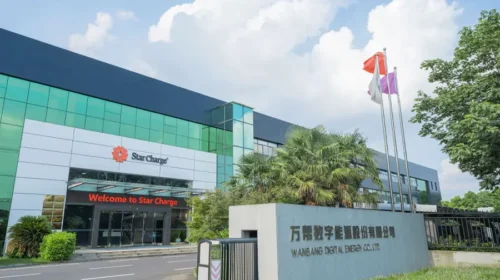Two Autonomous Driving IPOs, and Alibaba Sheds a ‘New Retail’ Asset

Horizon Robotics and WeRide have raised more than $1 billion combined in their IPOs in Hong Kong and New York. And Alibaba looks to sell its RT-Mart hypermarket chain.
By Doug Young & Rene Vanguestaine
Two new IPOs from the autonomous driving sector have raised more than $1 billion collectively, signaling strong investor interest in this emerging and rapidly evolving field. Last week, Horizon Robotics went public in Hong Kong, raising $700 million, while WeRide listed in New York, bringing in $440 million. Both companies saw modest gains on their first day of trading, with Horizon Robotics rising 3% and WeRide gaining 7%. These listings were among the largest by Chinese companies in New York and Hong Kong this year, highlighting renewed confidence in the sector among international investors.
The timing of these IPOs appears favorable, as they came shortly after the Chinese government’s announcement of major new stimulus measures, which have boosted China stock valuations in both Hong Kong and the U.S.
The autonomous driving sector is also gaining significant attention as a high-potential field, with widespread applications across various industries, from ride-hailing to logistics. Chinese companies are seen by some as leaders in this space, so there are a fair amount of investors who are willing to throw money at them right now. And the markets are becoming more receptive to Chinese companies in particular, even more so in this sector.
Also very importantly, the sector is among those that the Chinese government is keen to promote as part of its focus on advanced technologies, aligning with China’s long-term vision to becoming a global leader in AI and automation. These factors have likely contributed to the positive reception for Horizon Robotics and WeRide, as investors are eager to back companies at the forefront of such transformative technologies.
The success of these IPOs may pave the way for more autonomous driving companies to go public in the near future. Pony.ai, another player in the autonomous driving sector, is already in the pipeline for a U.S. listing, but may choose to go public after the U.S. election. When pioneering companies succeed in their market debuts, it often attracts others to take similar steps, especially in a sector that is experiencing rapid innovation and growth.
Horizon Robotics and WeRide have positioned themselves as key players in this evolving landscape, and their performance could serve as a benchmark for other companies considering similar moves. Lots of companies are hungry for capital and the bankers behind them are hungry for deals.
Alibaba’s Divestment from Brick-and-Mortar
In what seems like a bid to refocus on its core e-commerce business, Alibaba has been shedding assets, including plans to sell its stake in Sun Art, the parent company of the once-dominant RT-Mart hypermarket chain. Alibaba acquired Sun Art in two tranches about five years ago as part of its “new retail” strategy, which aimed to merge online and offline shopping to create a seamless consumer experience. However, the company is now looking to sell Sun Art at a loss, with interest reportedly coming from Hillhouse Capital and DCP Capital.
Although Alibaba is divesting from some of its brick-and-mortar assets, it still retains ownership of the Freshippo chain, which suggests it isn’t entirely abandoning the physical retail space. Freshippo was developed with a strong focus on integrating technology into the retail experience from the start, unlike Sun Art, which was a legacy brick-and-mortar operation that required significant investment to modernize. Freshippo remains a key part of Alibaba’s retail portfolio, though Alibaba previously considered spinning it off as an independent entity before reversing course. Freshippo stores are designed to cater to the modern consumer, offering a blend of online ordering, in-store shopping, and fast delivery, which aligns well with Alibaba’s broader strategy of providing a tech-driven retail experience.
The diverging fortunes of Alibaba’s retail ventures highlight the challenges of combining traditional brick-and-mortar operations with digital innovation. While Freshippo was built from the ground up with technology in mind, RT-Mart represented a more challenging transformation. And the struggles are not unique; other major hypermarket chains in China, such as Walmart and Carrefour, have also faced difficulties adapting to changing consumer preferences and the rapid shift towards e-commerce. The rise of e-commerce platforms like Meituan and Dingdong, which offer fast delivery of groceries and other essentials, has reshaped the retail landscape, especially among younger consumers who prioritize convenience and speed over traditional shopping experiences.
The future of hypermarkets like RT-Mart remains uncertain, as they struggle to compete with the convenience of e-commerce and changing consumer habits. Meanwhile, chains like Costco and Walmart’s Sam’s Club are gaining traction by positioning themselves as destination shopping experiences that appeal to both younger and older generations. These warehouse-style stores offer bulk purchasing at competitive prices, providing a distinct value proposition compared to traditional hypermarkets. The experience of shopping at a Costco or Sam’s Club is also seen as more of an outing, where consumers can explore a variety of products and enjoy a sense of discovery, which is something that traditional hypermarkets have struggled to replicate.
About China Inc
China Inc by Bamboo Works discusses the latest developments on Chinese companies listed in Hong Kong and the United States to drive informed decision-making for investors and others interested in this dynamic group of companies.
Subscribe to China Inc on your favorite app:






